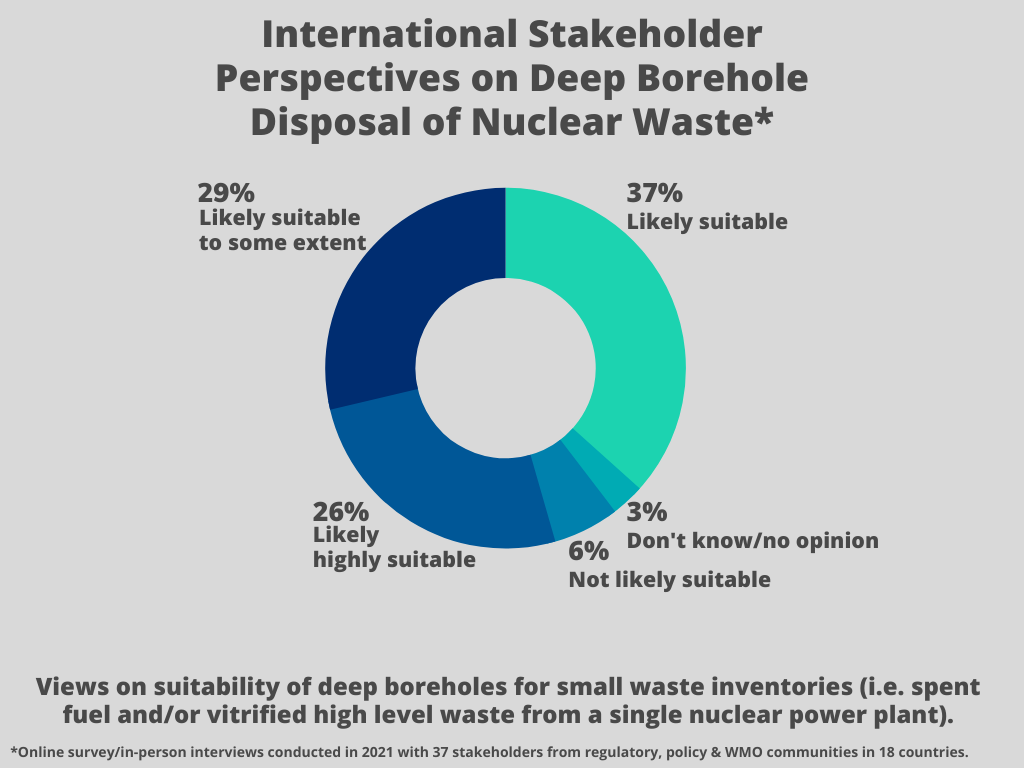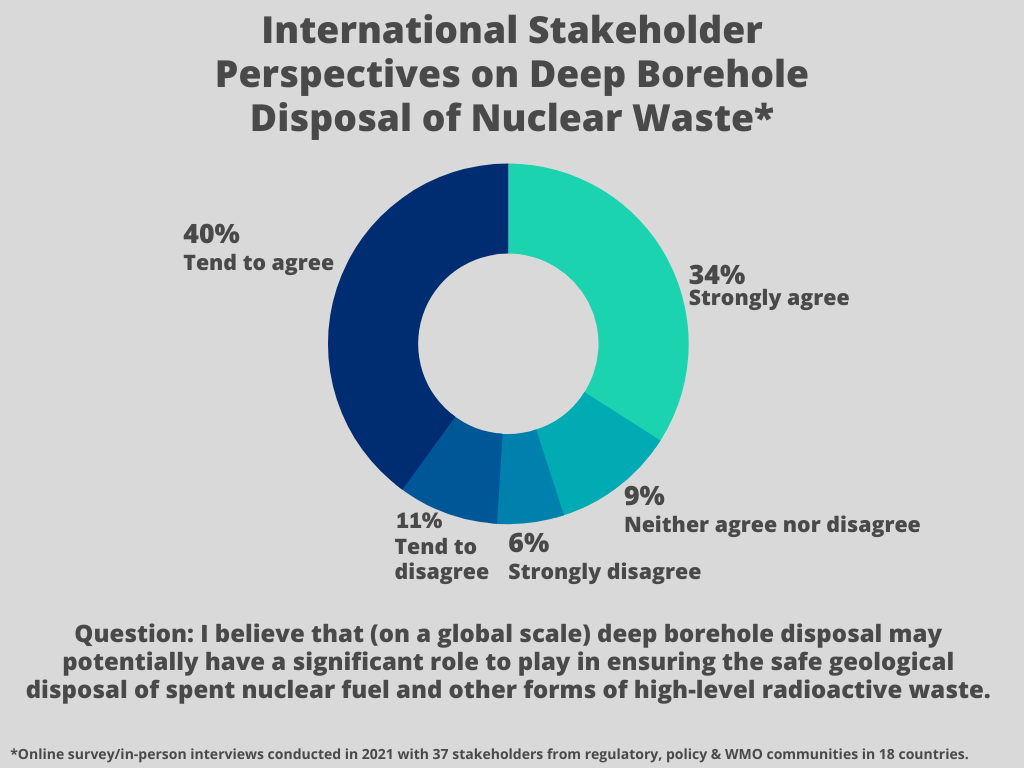Editor’s note: This is an excerpt of an article that was originally published in the March edition of Nuclear Engineering International’s magazine, which is available via a subscription here. You can view our paper, “Implementing Deep Borehole Disposal: Study of International Stakeholder Views from Regulatory, Policy & WMO Communities,” presented at the March Waste Management Symposia, here.
By Chris Parker
Deep Isolation EMEA Ltd, Managing Director
New research affirms that there is growing interest worldwide in the advancement of deep boreholes as an option for the disposal of nuclear waste.
Deep boreholes offer a scalable, modular, and more economical disposal solution for spent nuclear fuel and high-level waste, particularly for countries with smaller waste inventories that may make the safety case for a mined facility costlier to demonstrate.
A study Deep Isolation conducted last year analyzed international stakeholder views across 18 countries in the Americas, Europe and the Asia-Pacific region to determine perceptions about deep borehole repositories for nuclear waste disposal. The results show that those surveyed agree overwhelmingly that the next best step for learning more about this solution is an end-to-end technology demonstration.
The deep borehole opinion research, which was preliminarily shared at the IAEA 2021 International Conference on Radioactive Waste Management and was presented in full at Waste Management Symposia 2022, is based on interviews and surveys with members of the regulatory, policy and waste management organizations. The majority of those surveyed said they believe boreholes potentially have a significant role to play and cited benefits including choice and flexibility thanks to a reduced physical footprint coupled with cost and time savings compared to centralized mined repositories.
Given that proposed changes to the EU taxonomy would dictate that nuclear waste and decommissioning funds must be in place and that there must be operational facilities for the disposal of low and intermediate-level waste streams, with a plan in place for a high-level waste disposal facility to be operational by 2050, the benefits of being able to potentially deploy a borehole repository in a fraction of the time of a mined repository could make this option even more attractive. Deep boreholes also could potentially be co-located with a mined repository if needed.
Research followed rigorous 7-step qualitative and quantitative process
The target research group was senior-level stakeholders with specific responsibilities for geological disposal of higher activity radioactive waste disposition, selected from the following six categories: National government policymakers; waste management organizations; nuclear and environmental regulators; international agencies that influence national policies; university researchers; and national laboratories and other research institutions specifically focused on radioactive waste disposal.
Following a seven-step qualitative and quantitative research methodology, 37 people completed an online survey, with 10 also participating in in-depth interviews; two additional subjects completed in-person interviews only.
The study was conducted by Deep Isolation internal experts as well as one external researcher, Prof. Neil A. Chapman of the University of Sheffield. Chapman is a leading expert in the geological disposal of radioactive wastes, with four decades of experience in environmental, strategic and waste management in the international nuclear industry.
“After years of seeing largely unstructured commentary on the potential role of deep borehole disposal in national waste management programs, this work has at last focused light on what a wide range of policy and decision-makers really think,” Chapman said. “The general consensus that (deep borehole disposal) could be incorporated into a suite of safe disposal solutions, considerably improving strategic and economic flexibility, ought to encourage countries to get together now and support an early multi-national demonstration project. This is becoming increasingly important as the world moves closer to a low-carbon nuclear power future.”


Benefits of deep boreholes
Survey participants were queried about the key potential opportunities and benefits that they believe deep boreholes can offer; and the policy/regulatory, technical/operational and societal challenges that remain to be addressed.
When it comes to benefits, 74 percent of respondents tended to “agree” or “strongly agree” that deep boreholes have a potential role to play in ensuring the safe geological disposal of the world’s higher activity radioactive waste.
The benefits highlighted by those surveyed included: Increased choice and siting flexibility, including the reduced physical footprint compared to traditional mined repositories; the potential for cost reductions across national waste disposal programs; potentially attractive features from the perspective of community consent; and potential for economies of scale when it comes to regulatory processes.
Deep Isolation’s borehole designs have potential for providing additional siting flexibility because they leverage directional drilling and geo-steering techniques to emplace disposal canisters in either vertical, inclined, or horizontal orientations in stable rock formations that have been isolated from the biosphere for millions of years.
The great majority of those interviewed said boreholes would likely be “suitable” or “highly suitable” for small waste inventories of spent fuel, for example fuel from research reactors, and/or for vitrified high-level waste that could be disposed of at or near a nuclear power plant.
As one regulator stated: “Some countries have to deal with wastes that are long-lived and hazardous for a long time, but maybe don’t have a major nuclear program and volumes are relatively small…. [borehole disposal] would be an attractive option because building a mined repository for relatively small volumes can seem unfeasible.”
But borehole disposal is not only an option for small inventory countries. More than half of the respondents believe that it is likely to be suitable, at least to some extent, for both small and large inventories. As one survey respondent said, “There’s a lot of work that demonstrates that potential usefulness is there for the U.S.A, for Germany — and therefore obviously for all nations.”
All told, 8-of-10 stakeholders said they want to see greater international collaboration on borehole disposal, with the No. 1 priority being a full-scale (non-radioactive) demonstration.
“Even if you had a hundred percent confidence that it would work as designed, I don’t think people would be comfortable until it actually has been used,” said one study participant. “So I think you would have to actually demonstrate the technology in order to gain acceptance by the entire community.”
Demonstrating technical readiness
Although spent fuel handling and deep drilling technologies are mature, Deep Isolation understands there are aspects of the deep borehole technology that will require additional technology maturation prior to industrial-scale deployment.
Deep Isolation recently completed its first preliminary technology readiness level assessment, and borehole expert Dr. Ethan Bates, Deep Isolation Director of Systems Engineering, presented a paper on this topic at Waste Management Symposia.
Overall, the technical assessment concludes that spent nuclear fuel handling above ground is the most mature technical industry process and that demonstrating borehole stability and canister emplacement is the highest priority in terms of technology development planning.
Other processes such as pre-closure monitoring, canister retrieval, and borehole sealing may also require additional development and demonstration, but the extent will depend on regulatory and risk-informed engineering requirements that are still being developed.
Given the readiness levels of Deep Isolation’s technology and processes, the company agrees with stakeholder study participants that an end-to-end demonstration should be a top priority.
We are committed to working with the international community to launch the planning process for a long-term collaborative permanent borehole demonstration.
Working with industry partners and government research institutions, we hope to assemble an independent, science-driven, non-profit task force of experts and citizens to oversee the effort. It would be the first ever public-private partnership devoted to researching how deep boreholes can be used to permanently and safely dispose of spent nuclear fuel and other types of high-level radioactive waste.
The goal of the project is to advance the technical readiness levels of deep borehole disposal in a progressive, cost-effective and strategic manner, accelerating the preparation for global deployment of this as a licensed disposal technology.
